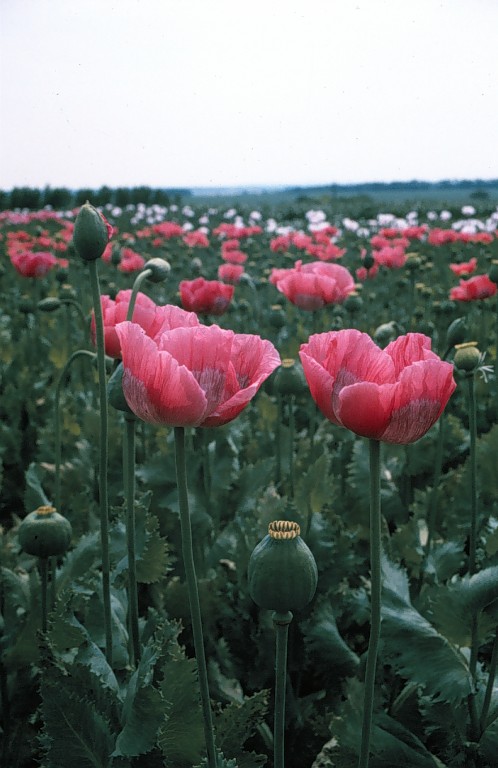Papaver somniferum L. – Poppy

Papaver somniferum is a herbaceous, annual medicinal plant in (Papaveraceae) family (Th). Poppy has 18-20 cm long, wooden taproot with few lateral roots. The stem is erected, 50-150 cm tall, branched on the upper part of the stem. The lower leaves in the rosettes are oblong, elliptic, don’t have stalks. The stem-leaves are alternate, oblong-ovate, the leaf size is smaller on the upper parts of the stem. The flowers are terminal, 6-12 cm diameter, white with darker (purple) patches on the basal part of the petals. The fruit is hollow capsule with compartments. The fruit size and shape is diverse. The seed is also variable, specific to the variety, but usually kidney-shaped, the seed colour differs from white too black. Thousand seed weight: 0.3-0.6 g.
Papaver somniferum has been known for 4000 years, originates from Anatolia. It is also distributed through Europe and cultivated on 80-100 thousand hectares worldwide. In Hungary the cultivation is regulated by the law, the industrial poppy cultivation is coordinated by Alkaloida Vegyészeti Gyár (Tiszavasvári). Two poppy ecotypes are known (and cultivated) in Hungary. „Spring” poppy’s vegetation lasts for 120-160 days, the seed germination is optimal at 7-10 °C, the leaf rosettes frost-tolerance is very low. To the contrary, „autumn” poppy’s growing period is longer (250-270 days), germination optimum is 15-20 °C, and the plants overwinter in leaf rosette phase. Poppy prefers nutrient-rich, neutral soils.
The plant can be utilized in several ways. In India, opium is manufactured from the unripe fruits: after scratching the capsules, the dried latex is collected for further processing. In the Hungarian Pharmacopoeia VIII. the dried, powdered (Pulvis opii) and crude opium (Opium crudum) is described. Nowadays the alkaloids are isolated from the dried capsules (Papaveris caput maturis). The isolation method was elaborated by János Kabay, famous Hungarian pharmacist. Papaveris caput maturis is one of the most important materials of Hungarian pharmaceutical industry. In Europe the consumption of poppy seed is widespread, too.
The main active agents of Papaver somniferum are alkaloids, formed from phenylalanine precursors. The total alkaloid content of the ripe capsules is 0.5-3.5 %, 40 different alkaloids are detected in the plant. The main alkaloids are: a morphine (0.4-2.0 %), codeine (0.3-0.7 %), thebaine (0.4-0.7 %), narcotine (0.3-1.0 %), narkctoline (0.1-0.3 %) and papaverine (0.3-1.0 %). Poppy seed doesn’t accumulate alkaloid, but contains 40-55 % fatty oil and 20-25 % protein.
Poppy alkaloids can be used only in pharmaceutical industry. Morphine has analgesic, euphoric effect, while codeine is applied against coughs and has mild analgesic effect too. The other alkaloids (papaverine, narcotine, thebaine, etc.) are also important medicament materials.

